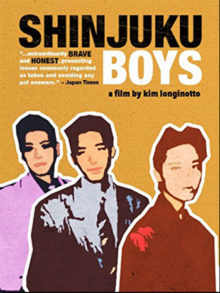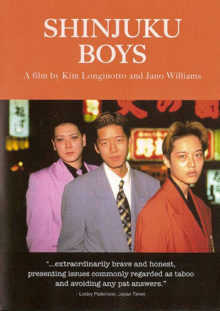 Shinjuku Boys
Shinjuku Boys
Directed by Kim Longinotto and Jano Williams
Premiered December 07, 1995, at the IDFA Festival, Netherlands
Documentary (Japan)
53 min.
Review by Stephen O. Murray
May 04, 1997
The 1995 documentary Shinjuko Boys follows three “boys” who are basically escorts in the Shinjuko sex district in Tokyo (specifically, the New Marilyn nightclub). They work out of clubs frequented by women who are single, conventionally feminine in dress and demeanor, and out to have a good time.
Many unmarried, employed, young Japanese women have the disposable income to have a good time, and those who rent “Shinjuko boys” do not appear to have any hangups about renting sexual services—either in general or from cross-dressed women in particular. [On Japanese women renting intimacy from male hosts, see “The Great Happiness Space.”]
The customers consistently refer to the Shinjuko boys as “The Perfect Men.” They explain that these “boys,” unlike those born male, are kind, considerate, funny, fun-loving, warm, gentle. What seemed odd to me was that these “boys” were socially and personally feminine, but they were costumed as men, emotionally and interactionally they are women. The customers strongly dislike men and the treatment they receive from men. There is no evidence that they seek to “transgress” any social order. It is much more that they want their pleasures focused upon.
As reported by the Shinjuko boys (rather than shown, sex with customers consists of the Shinjuko boy “doing” the customer in the manner of the “stone butch” of old who was not touched by the swooning femme partner.) The Shinjuko boys keep their clothes on. Perhaps this gender presentation allows the customers to protect themselves from considering that their relationship was “lesbian.” That is, the customers want to interact with women, but they want to (seem to) see men. They get “womanly” interaction—consideration, gentleness, caring—with masculine visual stimuli ( the butch haircuts, the suit that remains on, etc.). Instead of providing sexual services, they get what they want. Many of the Shinjuko boys said it was common to give a customer her first orgasm (generally through oral sex).
Like American prostitutes of both sexes, they reserve certain acts or symbols for the sex they have for pleasure rather than for remuneration. They said that if they took off their clothes, then it would be women’s flesh touching women’s flesh—they would be lesbians, which they did not want to be (or to be considered as being).
 One of the three featured boys was in a long-term domestic relationship with a woman, a former customer (although getting emotionally/romantically involved with customers is very taboo within the occupation). This boy was taking male hormones and had a few facial hairs. This couple said that they both took off all their clothes when they had sex together. The woman said that she loved her partner, and the “boy” said that her affirmation was very important to him. The woman said that it would upset her if she saw customers touching her partner, especially if they touched his face. So the boy tried to make sure that customers did not touch him, but from the footage shot in the clubs, contact seems rare anyway—it would be too forward for a woman to touch a “man.” This Shinjuko boy did not kiss customers.
One of the three featured boys was in a long-term domestic relationship with a woman, a former customer (although getting emotionally/romantically involved with customers is very taboo within the occupation). This boy was taking male hormones and had a few facial hairs. This couple said that they both took off all their clothes when they had sex together. The woman said that she loved her partner, and the “boy” said that her affirmation was very important to him. The woman said that it would upset her if she saw customers touching her partner, especially if they touched his face. So the boy tried to make sure that customers did not touch him, but from the footage shot in the clubs, contact seems rare anyway—it would be too forward for a woman to touch a “man.” This Shinjuko boy did not kiss customers.
Another “boy” was in a domestic relationship with a male-to-female cabaret singer. They said that they loved each other, especially the gender performance. They seemed to have a very solid and close emotional relationship, but they said that they did not have sex: they were clearly not interested in each other’s bodies (wrong sex) but were hot for each other’s illusions. They could legally wed, which would end the unwelcome pressure they were getting pressure from their families to settle down.
The last Shinjuko boy didn’t seem to have sex with anyone, just performing sex on customers. He was portrayed as having had a traumatic childhood with his family, and he had been broken hearted by a high school teacher who ended their four-year domestic relationship by running off and marrying a man. It seemed that he could “do” customers but could not get romantically involved for fear that these straight girls would eventually get old and panic, and in seeking legitimacy in love would leave him.
© Stephen O. Murray, 04 May 1997

